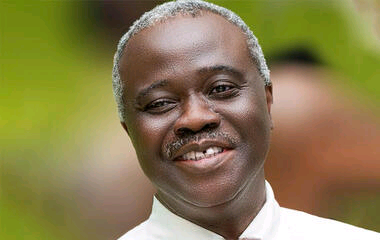Professor John Owusu Gyapong will become the new secretary-general of the African Research Universities Alliance, or ARUA, at the end of July 2024.
As the leader of a network of research institutions in Africa, Gyapong’s key message to policy-makers is that higher education is not cheap.
“Governments must fund higher education. African governments have all agreed to commit 1% of their GDP towards research, but if you take Sub-Saharan Africa, for example, when I last checked, no country was doing that.
“Research is essential for development. If Africa wants to develop, we need to fund our own research,” Gyapong told University World News from his current base in Washington in the United States where he is on sabbatical leave at Georgetown University.
The appointment of Gyapong, who will take over from Professor Ernest Aryeetey, was approved by ARUA’s board in November.
One of his major tasks at ARUA will be to sustain the momentum of the collaboration between ARUA and the Guild of European Research-Intensive Universities (The Guild), which has created 20 Clusters of Research Excellence (CoREs) involving institutions from both networks. The CoREs, in turn, are expected to contribute to the realisation of a broader African Union-European Union collaboration agreement backed by an investment of US$158 billion.
UWN: From being a medical officer, along the line you became a pro vice-chancellor, then a vice-chancellor and now secretary-general of ARUA – that must have been a journey.
JOG: When I went to medical school, I had no clue that I was going to end up as a secretary-general of ARUA.
In any case, ARUA didn’t exist in 1980, when I went to medical school. It’s an issue of some opportunities coming my way and me taking advantage of them. In all these circumstances, I had no clue I was going to end up doing everything that I have been doing for the past two decades.
I went to medical school primarily because I wanted to study medicine and help in the healthcare delivery system in Ghana. After working with the ministry of health at that time for a while; working at Komfo Anokye Hospital in Kumasi for a while, and then doing a stint as a locum at Dormaa-Ahenkro Presbyterian Hospital and a few other places, it became clear to me that the solutions for our healthcare system resided in having an efficient public health system.
So, I decided to study public health and I ended up in the Navrongo Health Research Centre, where several epidemiological trials, including ones focusing on Vitamin A, malaria and neglected tropical diseases, were conducted.
I did a masters in public health, then a PhD in epidemiology. So my focus was more on health research. Along the line, through all kinds of work, I became the director of the health research unit of the then Ghana Ministry of Health, which later became the research and development division of the Ghana Health Service (GHS).
At that time, I was teaching on a part-time basis at the University of Ghana. After about 10-12 years of serving as the director of the research division, the next potential position was to become the director-general of the GHS.
UWN: How did your appointment as ARUA secretary-general come about?
JOG: I saw an advert while sitting here in Georgetown University, in the US, where I’m on sabbatical leave until March next year (2024). The criteria that were outlined were something that I fitted and, beyond that, the job was something that I thought I could do.
First of all, the advert said the person must have been a former vice-chancellor or pro vice-chancellor with responsibility for research, or the eligibility to be appointed as such.
Being the secretary-general for these research universities [that form part of ARUA], you’re going to be dealing with vice-chancellors of top universities in Africa, so it requires somebody who has the experience and the clout to be able to engage – that was one of the key things they were looking for.
Beyond having this experience, you must also have a vision that you want to espouse, to lead ARUA to the next level, especially given the excellent work that the founding secretary-general has done.
I took a look at the advert and decided to compete. There were about two rounds of interviews and, at the end of the day, I was recommended to the board, and last month [November] at the ARUA biennial conference in Lagos, Nigeria, the board approved my appointment as the next secretary-general.
UWN: What is ARUA’s role in higher education in Africa?
JOG: What ARUA has set out to do is expressly stated in its strategic plan. It is a network of selected flagship universities in Africa who have a common vision to expand the quality of research carried out in African research universities by Africans.
It has a mission to make African researchers and institutions globally competitive while contributing to the generation of knowledge for social and economic transformation in Africa.
These universities have come together to pursue these goals. Although there are several universities in Africa, only a few are in this alliance. So, it’s like bringing like-minded people together to galvanise themselves into doing more, and most importantly, to be impactful on the continent.
UWN: What are you bringing on board?
JOG: First of all, I wanted to galvanise the support of all stakeholders to help me provide strategic leadership to ARUA with the support of the board. I did not create ARUA. It has its goals and so the secretary-general is supposed to provide leadership to achieve them.
So, I’m hoping that I’ll focus on some key areas to enhance the research enterprise of ARUA institutions and to build research capacities for the next generation
I think there’s also a need for us to come up with some strategy to enhance ARUA’s visibility, because, if you mention ARUA, it’s not everybody in the higher education space who knows the organisation and what it does.
UWN: What are the challenges facing ARUA?
JOG: The main challenge is financial and so we need to look for money. There are many good initiatives that have been created, like universities engaging with each other in collaborative research, for example in climate change, non-communicable disease, and so on.
In such a situation, if an institution is leading in the research on climate change or non-communicable diseases because it has the capacity, all it needs to do is to identify other researchers within the other ARUA universities doing work on climate change or non-communicable disease, so they form a kind of consortium to work.
Since they need to be funded, we need to help to look for funding for them …
UWN: A milestone that ARUA has achieved in collaboration with The Guild of European Research-Intensive Universities (developed in the context of an agreement between the African Union and the European Union) has created 20 Clusters of Research Excellence. How do you plan to keep the momentum?
JOG: The Guild is partnering with ARUA by providing the major funding [stream] which comes from the European Commission. So, the issue is, if the European Commission is funding the collaboration for two to three years, it provides breathing space to begin to look for counterpart funding to ensure that this initiative is sustainable.
Thus, beyond this funding, we need to begin to explore other sources of funding to initiate more clusters of research excellence or to provide more funding for the work that is being proposed by each cluster. By bringing in more [funding] partners, ARUA would be able to enhance the sustainability of its programme and increase visibility as well.
UWN: If you can send a message to policy-makers, what are some of the key factors that could strengthen higher education in Africa?
JOG: My key message is that higher education is not cheap, but it is relevant. Governments must fund higher education. African governments have all agreed to commit 1% of their GDP towards research, but if you take Sub-Saharan Africa, for example, when I last checked, no country was doing that. Research is essential for development. If Africa wants to develop, we need to fund our own research.
WUN














